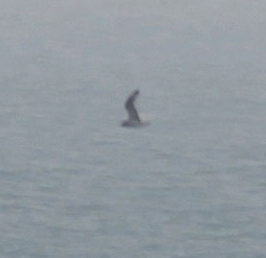The first week of my last season on Po Toi.
On the land, some new spring species. On Tuesday, Crested Goshawk (may have been there all winter), Common Sandpiper and two migrant Large-billed Crows, the first time I have seen them flying in off the sea. On Wednesday, a very early male Red Turtle Dove, not sure what that was doing, three Pacific Swifts as noted by Brendan and an Olive-backed Pipit. And on Thursday, a White-throated Kingfisher which may also have been there all winter. The Hoopoe, Grey-headed Flycatcher and Brown Shrike certainly have been there all winter and still this week. No sign of the Black-throated Tits but single Japanese and Pale Thrush are probably new arrivals.
This has been a poor year on Po Toi for Japanese/Manchurian Bush Warbler. A few normally over-winter, but this year none - until this week when one started singing in the early morning just past the sister's cafe and I was lucky to get a good view on Thursday



This is a recent species split and the two are known to be difficult to separate, but judging by the general bright rufous colour, particularly on the nape (Kennerley page 599), and the largish bill and legs, I think this could be a male Japanese
Horornis diphone ssp canturians. I also recorded the song, a short condensed section here
http://www.geoffwelch46.com/JAPBWSONG.mp3
At sea, March is the time for gulls and Ancient Murrelet, and this week did not disappoint.
One Ancient Murrelet on Wednesday morning and a group of three on Thursday morning. I was a bit slow picking them up, so no photos (they move really fast) but this brings my total number of this species to 70 over the eight years from 2006, 48 of these in March.
Late afternoon in March is always the best time to see gull migration, it seems they set out about two hours before sunset and mostly migrate overnight. Wednesday evening was a good example, 194 Heuglin's type and 114 Black-tailed passing in two hours from 15.45pm, mostly first and second winter birds and all heading north-east out of the Dangan Channel. This has been a good spring for Black-tailed Gulls, as noted by Brendan above, and this is my highest daily count for Black-tailed.
But best of all, a Black-legged Kittiwake close in at 16.27pm


Then I immediately noticed another small gull further out


another Black-legged Kittiwake! Then 30 minutes later, another


I didn't see any gulls of any species coming back after having passed me, so my conclusion is, at least two and probably three Black-legged Kittiwakes.
I've wondered why we get so many seabird species from Japan and Korea wintering so far south in Hong Kong waters. I think the answer lies in a cold current which sweeps down the coast of east China in winter and causes low sea temperatures in our area in February

sea temperatures in February almost as cold as those in south Korea and Japan.
The only big disappointment of the week was to be refused a $2 fare on the ferry (see my report for the Last Week in February). I was told by the ferry staff that this fare only applies to ferries with Octopus Card Readers. I'll be writing a letter for explanation to the relevant Government Department - why advertise at the Ferry Pier if it doesn't apply to that Ferry Company?
My wife has reversed her decision to ask me to go to Po Toi more often - back to square one Mike.
[
Last edited by wgeoff at 8/03/2013 08:20 ]


